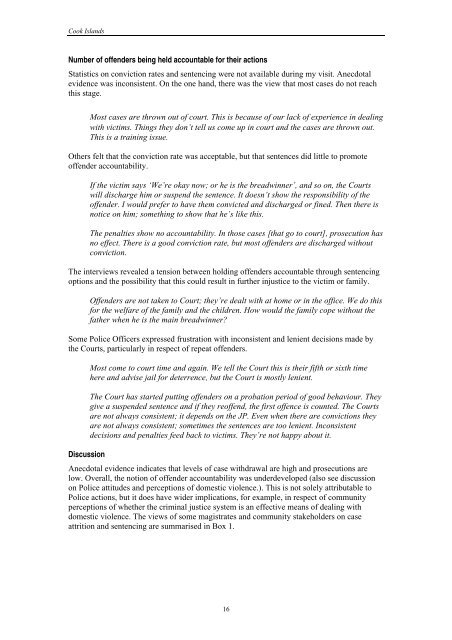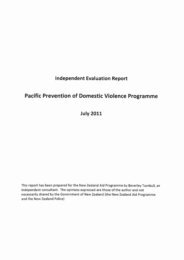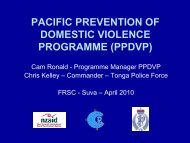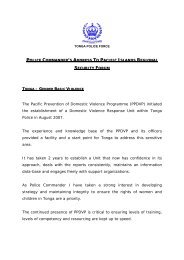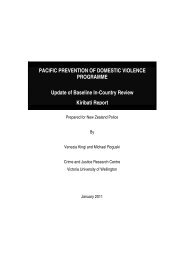Cook Islands - Pacific Prevention of Domestic Violence Programme
Cook Islands - Pacific Prevention of Domestic Violence Programme
Cook Islands - Pacific Prevention of Domestic Violence Programme
You also want an ePaper? Increase the reach of your titles
YUMPU automatically turns print PDFs into web optimized ePapers that Google loves.
<strong>Cook</strong> <strong>Islands</strong><br />
Number <strong>of</strong> <strong>of</strong>fenders being held accountable for their actions<br />
Statistics on conviction rates and sentencing were not available during my visit. Anecdotal<br />
evidence was inconsistent. On the one hand, there was the view that most cases do not reach<br />
this stage.<br />
Most cases are thrown out <strong>of</strong> court. This is because <strong>of</strong> our lack <strong>of</strong> experience in dealing<br />
with victims. Things they don’t tell us come up in court and the cases are thrown out.<br />
This is a training issue.<br />
Others felt that the conviction rate was acceptable, but that sentences did little to promote<br />
<strong>of</strong>fender accountability.<br />
If the victim says ‘We’re okay now; or he is the breadwinner’, and so on, the Courts<br />
will discharge him or suspend the sentence. It doesn’t show the responsibility <strong>of</strong> the<br />
<strong>of</strong>fender. I would prefer to have them convicted and discharged or fined. Then there is<br />
notice on him; something to show that he’s like this.<br />
The penalties show no accountability. In those cases [that go to court], prosecution has<br />
no effect. There is a good conviction rate, but most <strong>of</strong>fenders are discharged without<br />
conviction.<br />
The interviews revealed a tension between holding <strong>of</strong>fenders accountable through sentencing<br />
options and the possibility that this could result in further injustice to the victim or family.<br />
Offenders are not taken to Court; they’re dealt with at home or in the <strong>of</strong>fice. We do this<br />
for the welfare <strong>of</strong> the family and the children. How would the family cope without the<br />
father when he is the main breadwinner?<br />
Some Police Officers expressed frustration with inconsistent and lenient decisions made by<br />
the Courts, particularly in respect <strong>of</strong> repeat <strong>of</strong>fenders.<br />
Discussion<br />
Most come to court time and again. We tell the Court this is their fifth or sixth time<br />
here and advise jail for deterrence, but the Court is mostly lenient.<br />
The Court has started putting <strong>of</strong>fenders on a probation period <strong>of</strong> good behaviour. They<br />
give a suspended sentence and if they re<strong>of</strong>fend, the first <strong>of</strong>fence is counted. The Courts<br />
are not always consistent; it depends on the JP. Even when there are convictions they<br />
are not always consistent; sometimes the sentences are too lenient. Inconsistent<br />
decisions and penalties feed back to victims. They’re not happy about it.<br />
Anecdotal evidence indicates that levels <strong>of</strong> case withdrawal are high and prosecutions are<br />
low. Overall, the notion <strong>of</strong> <strong>of</strong>fender accountability was underdeveloped (also see discussion<br />
on Police attitudes and perceptions <strong>of</strong> domestic violence.). This is not solely attributable to<br />
Police actions, but it does have wider implications, for example, in respect <strong>of</strong> community<br />
perceptions <strong>of</strong> whether the criminal justice system is an effective means <strong>of</strong> dealing with<br />
domestic violence. The views <strong>of</strong> some magistrates and community stakeholders on case<br />
attrition and sentencing are summarised in Box 1.<br />
16


